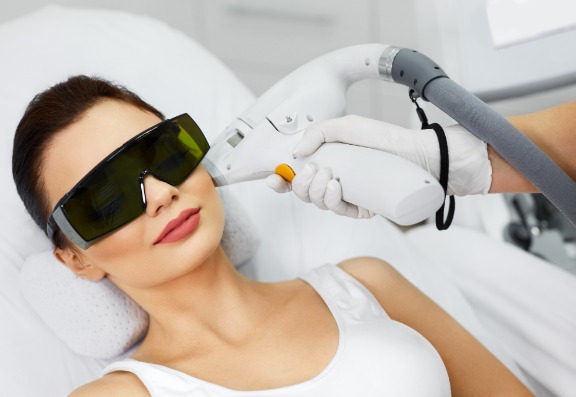What is a laser?
A laser is a highly focused and intense beam of light used in various skincare treatments.
It delivers precise energy to target specific skin concerns, such as sun damage, wrinkles, and pigmentation irregularities. By stimulating collagen production and promoting skin regeneration, lasers can rejuvenate and improve the overall texture and appearance of the skin.
They are a popular non-invasive or minimally invasive option, offering effective results with minimal downtime.

How does a laser work?
What’s the difference between ablative and non-ablative lasers? And how do I know which one I need?
What is a fractional laser?
Is laser painful?

Is laser safe for skin of colour?
If you want to read more, the experts at Consulting Room really know what they're talking about and have put together some lines and wrinkles, pigmentation, skin texture concerns, Laser and intense pulsed light (IPL) Skin rejuvenation, scarring and Fractional laser FAQs just for you.
If you have more questions, you can use the lines and wrinkles, pigmentation, skin texture concerns, Laser and intense pulsed light (IPL) Skin rejuvenation, scarring and fractional laser questions feature to talk to our panel of trained medical experts.
If you're keen to get started with any of these treatments right away then you're in luck - those clever folks also have a list of trusted, accredited lines and wrinkles, pigmentation, skin texture concerns, Laser and intense pulsed light (IPL) Skin rejuvenation, scarring and fractional laser clinics in your area.
Thanks to Dr Anjali Mahto, the skin expert from Self London.
In 2023, Dr Mahto opened her own clinic, Self London where she specialises in acne and acne scarring, but is a leading expert across many skin conditions.
Dr Anjali Mahto is a UK-trained consultant dermatologist and author of the bestselling book, The Skincare Bible: Your No-Nonsense Guide to Great Skin
She is happy to consult both adults and children with skin, hair and nail disorders. Her areas of specialist interest include acne and scarring, rosacea, moles, and anti-ageing therapies including injectable and laser treatments.

A survey reveals that most people trust dermatologists far more than social media influencers, yet many continue to spend money on treatments that don’t work.
Belotero vs. Juvederm: They are two of the most popular fillers for lip augmentation, but which is the right one for you?
Croma’s latest range brings professional in-clinic results into your everyday routine. Clean, vegan, and packed with powerhouse ingredients, these products are designed to hydrate, brighten, protect, and fight early signs of ageing.
Hey, wait!
Before you go.....
Let's stay in touch, pop your details here and we'll send our editor's hand-picked updates on your fave subjects.